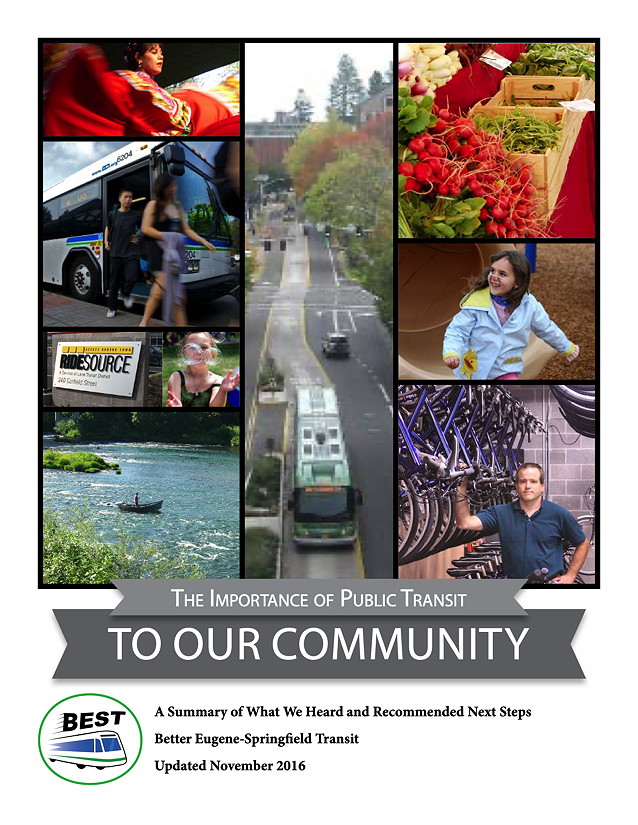Transit plans better when we make them together
We are republishing this guest viewpoint, which originally appeared in The Register-Guard on June 10, 2014, on page A9.

We’re better when we speak together.
Alas, next to the Civil War football game, our most popular sport may be debating transportation. We divide into competing teams to fight over cars, buses and bicycles. But are such scrimmages constructive, or is there a better way to make decisions together?
A case in point was the community debate over the EmX bus rapid transit system in west Eugene. Even after numerous open houses, public forums, newsletters, meetings with property and business owners, advisory committee meetings, public hearings and work sessions, many still don’t know answers to basic but critical questions: Why EmX in west Eugene? Why EmX at all? Is the project part of a larger master plan? What are the true costs of EmX compared to regular bus service? Perhaps we didn’t start the conversation asking the right questions.
Of course, we argue because we know that how we get around greatly affects our quality of life.
At stake is how we balance public and private property rights, and how we use public funds. But must transportation decisions always result in winners and losers, or can we find ways to advance multiple goals at once?
We’re better when we speak together.
Better Eugene-Springfield Transit, or BEST for short (best-oregon.org), is a privately funded and independent nonprofit organization that educates the public about and promotes a regional transit system that fosters prosperity, social equity and a healthy natural environment.
More broadly, we believe good transportation options are good for everyone. We include community leaders representing businesses, social services, the environment, schools, neighborhoods, people of faith and other community groups. We strive to work together to find win-win-win solutions that advance all our interests.
Our community is at a juncture. The decision to proceed with EmX in west Eugene is almost two years behind us. Decisions on whether and where to build other EmX lines envisioned in regional plans lie ahead: Springfield is starting to look at possible transit improvements along Main Street to the east and along McVay Highway to Lane Community College; Eugene will be looking at improvements along River Road, Highway 99, and south to LCC.
We have an opportunity to have a more enlightening and constructive discussion. BEST suggests we build on our shared values, and start by asking why.
The recent Oregon Values & Beliefs Project (oregonvaluesproject.org) concluded: “Oregonians across the state share a True North—a guiding set of values and beliefs—on many topics.” Specifically in regards to transportation, the 2013 survey of almost 4,000 Oregonians in all parts of the state found that “a majority of Oregonians support investment in public transit and consider such investment more important than investing in roads for cars.”
But maintaining the roads and highways we have ranks higher than providing public transportation. With broad agreement on basic values, there is hope we can find common ground.
According to Simon Sinek, great leaders start by asking why: Why transit? Why have transit at all? What purpose does it serve? What benefits do a strong transit system provide? How does transit support the things we value as a community and our vision for our future? By starting with why—ends before means—questions about if, where, when, who and how much will become easier to answer.
BEST doesn’t pretend to have all the answers. We do know we can all learn by listening to each other. We are listening to lots of groups about the kind of community we want to have, and the role of transit. At 5:30 p.m. today at the LCC Downtown Center, we are holding a public forum to hear from anyone who believes we can do better. We hope you will join us. If you can’t make the public forum, share your views via an online survey (best-oregon.org/survey).
This summer, BEST will report to the community what we have heard. If there are some common themes, areas of agreement, we hope to suggest possible next steps for moving forward together.
Transit, like all modes of transportation, isn’t an end in itself but a means to an end — literally a way to get from here to there.
Let’s begin anew talking about where we want to go as a community. Then, perhaps, figuring out how to best get there will be easier.
We are better when we listen to and learn from each other, and find ways to speak together.
Gerry Gaydos and Terry Beyer are members of the Better Eugene-Springfield Transit board of directors. Fellow board members Susan Ban and Rob Zako helped write this essay.
See also
- Community Conversations Report (BEST, Nov. 2016)